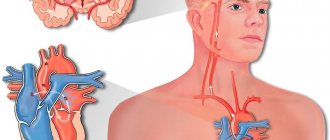From ancient Greek, the word “coma” is translated as “deep sleep.” In the myths of those distant times, the god of sleep, Hypnos, was called the brother of Thanatos, the messenger and personification of death. In modern medicine, “deep sleep” in a coma is also considered borderline and near-death.
In this state, consciousness is lost, reflexes fade, the frequency and depth of breathing is disrupted, the pulse and vascular tone change abnormally, and the mechanisms of temperature regulation are disrupted.
What causes coma?
The coma is caused by impaired blood circulation in the brain and/or toxic damage to the cells of the central nervous system. These pathologies arise for the following reasons:
- head injuries;
- drowning, suffocation, cardiac arrest;
- stroke;
- decompensated diabetes mellitus;
- meningitis, encephalitis;
- kidney or liver dysfunction as a result of poisoning or disease;
- epileptic seizures that follow one after another.
In addition, there is an artificial medical coma. It is used as an alternative to anesthesia if a neurosurgical operation is performed, as well as when the patient is brought out of an epileptic state.
Causes
The cause of a comatose state during a stroke is apoplexy, which is accompanied by hemorrhage in the brain and leads to loss of consciousness and complete or partial loss of reflexes.
Damage to blood vessels and brain cells occurs under the influence of various factors:
- A sharp change in blood pressure in one of the brain regions.
- Brain swelling due to hormonal imbalances and hypoxia (lack of oxygen supply) of brain cells.
- Ischemia of internal organs (insufficient blood supply).
- Accumulation of beta-amyloid protein in brain vessels.
- Poisoning of the body by tissue decay products.
- Atheroma of the walls of blood vessels.
- Lack of vitamins.
- Collagenosis, accompanied by changes in capillaries.
- Problems with the composition and properties of blood.
Ischemic stroke less often leads to loss of consciousness than hemorrhagic stroke. With an ischemic stroke, the patient is able to recover from a coma on his own, and hemorrhagic hemorrhage is characterized by a high probability of a coma. It is very dangerous because... leads to the death of brain cells over large areas.
Depth of coma
A comatose state can develop gradually over several days, or occur suddenly in a matter of minutes. According to the degree of depth, the following stages of coma are distinguished:
- Precoma with severe retardation or, on the contrary, psychomotor agitation. Reflexes are preserved, coordination of movements is impaired, thinking suffers.
- The first degree, in which sleep or stupor occurs. Reactions to external stimuli are inhibited, but the person can take liquid food and make simple movements.
- Second degree, the stage of deep sleep with a complete lack of contact, pathological forms of breathing, rare chaotic movements, weakened pupillary response to light, convulsive muscle twitching.
- The third degree, in which there is no consciousness, there is no reaction to painful stimuli, reflexes are lost, the normal breathing rhythm is lost, blood pressure drops, and body temperature decreases.
- The fourth degree or extreme coma, in which reflexes disappear, muscle tone is absent, and blood pressure and temperature drop sharply. Spontaneous breathing stops. It is supported by artificial ventilation, and nutrients are injected.
Death most often occurs in a state of extreme coma. However, if a person can be brought out of it, and further improvement occurs, then brain functions can be restored partially or completely.
The general is not with us yet
More than 3 years ago , Maria Konchalovskaya, the daughter of director Andron Konchalovsky, . In October 2013, in France, the Konchalovsky family was involved in a serious accident. The director and his wife Yulia Vysotskaya escaped with minor bruises thanks to the deployed airbags. And the girl, who was not wearing a seat belt, received a severe head injury. Doctors saved the child's life, but warned that recovery would be long. Alas, their prediction came true. The girl's rehabilitation continues.
of Colonel General Anatoly Romanov , commander of the united group of federal troops in Chechnya, has been ongoing for 21 years On October 6, 1995, his car was blown up in a tunnel in Grozny. Romanov was literally assembled piece by piece. Thanks to the efforts of doctors, after 18 days the general opened his eyes and began to respond to light, movement and touch. But the patient still does not realize what is happening around him. What methods did the doctors use to “break through” into his consciousness? For 14 years, the general was treated at the Burdenko hospital. Then he was transferred to a hospital for internal troops near Moscow. But for now, this strong and courageous man, as doctors say, is in a state of minimal consciousness.
Article on the topic
Between life and death.
Stories of people who fell into a coma for years Sharon Stone suffered an intracerebral hemorrhage, due to which she was in a coma for 9 days. Stevie Wonder, an American blind soul singer , was in a serious car accident and was in a coma for 4 days; after leaving, he partially lost his sense of smell. In 2013, seven-time Formula 1 champion Michael Schumacher . He remained unconscious for more than six months. Then there was progress in his condition, but rehabilitation continues to this day.
Communicating with a person in a coma
Those who managed to come out of a coma say that they felt as if they were in an extremely deep sleep. Some report that very near-death tunnel, at the end of which a bright light was visible. Almost everyone remembers nothing about the events that led to the coma, and, moreover, about what happened to them in this state.
However, although comatose patients have no reaction to external stimuli, there is reason to believe that some forms of subconscious perception still remain. Therefore, the British Department of Health has made the following recommendations for those visiting a relative, loved one or friend who is in a coma:
- Introduce yourself and share the news in a positive way.
- Talk about your current life as if the person in a coma were an ordinary interlocutor, or rather, a listener.
- Show your support. To do this, just sit next to him and hold the person’s hand.
- Let him listen to his favorite music using headphones.
What could be the way out of a coma?
There are three options for exiting a coma. The first involves partial restoration of the nervous system and brain function. After this, everything will depend on the success of the rehabilitation course. In some cases, a person recovers so much that he can do without outside help and live an almost normal life.
Of course, some consequences will still remain. Staying in a coma cannot pass without leaving a trace. It is likely that motor, speech, and cognitive impairments will remain, and personality changes will occur. But this is something that a person’s loved ones are usually prepared for. His return in itself is perceived by them as salvation.
Even when, despite long-term rehabilitation, a person remains disabled, this is not the worst thing that can happen to him. Because the second option is to exit the coma into a vegetative state.
In this case, cognitive, motor, and speech abilities will be lost. But the person will remain alive, and as long as he is alive, there will be hope. Even if from a medical point of view it is equal or close to zero.
The person will need constant care, attention, care, to which he probably will not even respond. Not everyone close to you is ready for this. But still, this is not the worst thing, because there is a third option for exiting a coma - death.
Our task, the doctors of the department of anesthesiology and intensive care of the International Clinic Medica24, is to ensure that the person comes out of the coma according to the first option. And when we succeed, we consider it our victory and success. This is the best reward for our efforts.
We will call you back
Message sent!
expect a call, we will contact you shortly
Rehabilitation after a coma
To bring a patient out of a coma, doctors make many attempts, and this process takes an indefinite amount of time. If persistent efforts are successful, the person’s consciousness returns, the mood for recovery is formed, and rehabilitation is carried out under the supervision of specialists.
For this purpose, targeted centers with multifaceted rehabilitation programs are created. In the Minsk region, one operates in the Aksakov region. Those who require specialized assistance are there free of charge.
Who to contact if you have a lump in your throat
The feeling of a lump in the throat is treated by a psychotherapist or psychiatrist. During the consultation, the doctor will assess the condition and determine the amount of assistance needed.
Help can be obtained in any clinic where there is a license to provide assistance in psychotherapy, psychiatry and neurology and where a psychiatrist or psychotherapist conducts an appointment.
ROSA Clinic
is a specialized and licensed clinic that provides assistance for all types of disorders accompanied by a feeling of a lump in the throat.
Our specialists
are ready to come to your home for consultation; you can also see a doctor in our clinic.
Treatment is most often carried out at home. If necessary, it is possible to be hospitalized in our own hospital, equipped with modern diagnostic equipment and where it is possible to carry out active treatment.
How is it determined that coma has turned into death?
Modern medicine is able to maintain breathing, cardiac activity and provide nutrition for a long time to a person in a deep coma. Death is declared when blood flow to the brain stops and irreversible pathological changes occur.
These changes are diagnosed using computed tomography or magnetic resonance imaging. The absence of any brain activity is determined by electroencephalography methods, and cessation of cerebral circulation is recorded angiographically.
Based on the totality of the obtained indicators, death is diagnosed and, in agreement with relatives, life support equipment is turned off.
Mechanism of coma development
Damage to neurons is accompanied by changes in the metabolism of nervous tissue. Intracellular fluid exits into the intercellular space. As it accumulates, it compresses the capillaries, causing the nutrition of nerve cells to deteriorate even more and their work to be disrupted. A comatose state can develop very quickly (several seconds or minutes) or gradually (up to several hours, less often days). Most often, coma occurs after a massive or brainstem stroke caused by hemorrhage, less often by blockage of the cerebral arteries.
Question and answer
Does it happen that a patient comes to his senses after he has been declared brain dead?
Such cases do happen. For example, on December 23, 2011, doctors definitely and objectively confirmed the brain death of 21-year-old American student Sam Schmidt, who fell into a deep coma after an accident. Sam's parents were advised to think about consenting to the removal of their son's organs for transplantation, and an hour later a consultation was to be held on the issue of turning off the equipment that supports life in his body. Suddenly Sam moved his fingers, began to respond to calls and woke up.
How to get to the rehabilitation center in Aksakovshchina?
From the metro station "Pushkinskaya", "Kamennaya Gorka" by minibus 1203 TK, from the railway station, metro station "Kamennaya Gorka" - by minibus 1500 TK.
Do the Belarusian media publish information about those who came out of a coma, about what they felt?
The most recent publication with such interviews was on the TUT.BY website in the “Health” section on May 20, 2021.
Coma is one of the most difficult and unpredictable conditions for doctors and patients
An international group of scientists wants to check the fascinating stories of people who survived a coma, about a tunnel at the end of which there is light, or about contemplating their own body from the outside. Pictures will be painted on the ceilings of operating rooms, and certain phrases will be whispered to patients in a coma.
If, upon waking up, they can repeat and describe all this, then an exact scientific answer to the most intriguing philosophical question will appear.
Report by Alexander Konevich.
Alexander Vergunov, actor: “And suddenly I take off and fly. A huge tunnel, an insanely intense blue light, and I was flying forward, spinning.”
He had never played anything like this on stage - and in life this has happened to actor Alexander Vergunov three times already.
He first fell into a coma when he was in the sixth grade, then in his third year at university, and just recently - an ordinary rehearsal almost turned into dancing with death. The reasons are heart problems and diabetes.
Sergei Komlikov, head of the intensive care unit of Minsk Hospital
emergency medical services: “This is not a phenomenon. They come out of a coma or don’t come out of it, depending on how much the disease that led to the coma is cured.”
Zhenya goes to the hospital almost every day - but only her mother is still allowed to see her friend Andrey. After the accident, he has been in a coma for almost a month - Odessa doctors miraculously saved him. But they don’t know how to make Andrei smile like that again - the hospital doesn’t have enough medicine.
Inna Torbinskaya, head of the neurovascular department of city clinical hospital No. 1: “We treat with words, with looks... In most cases. And if there are medications that relatives are able to buy, then we carefully select the medications that the patient needs.”
Andrei's parents and friends are together raising money for treatment. They believe that there are improvements, and do not lose hope.
Evgenia Onosova: “When he had an accident, I had the impression that the sun had disappeared. Well, you know (wipes away tears) the sun has disappeared..."
In the intensive care unit of the Neurology Research Center, two patients are now in a coma. The man was brought in quite recently, and no doctor can now guess how long he will stay in this condition.
The readings of the device can be called life lines. Electrocardiogram, pulse, pressure, temperature, blood oxygen level. The data in this particular case, however, is not very good. You don't need to be a doctor to understand this.
Reanimatologists, of course, are able to make the numbers here the same as if there was a completely healthy person in a hospital bed. However, unfortunately, this does not mean defeating coma.
Recovery takes months, and more often even years. Patients who have fallen into a coma have a special diet; some cannot breathe on their own. They cannot do without the help of doctors, even when the critical condition is over, says Dr. Selivanov.
The intensive care unit of the Neurology Research Center has the necessary equipment and medications. Only there are many more such patients than this ward can accommodate.
Vladimir Selivanov, resuscitator at the Scientific Center of Neurology of the Russian Academy of Medical Sciences: “Currently, these patients, saved by us, remain on the shoulders of relatives. They rush from one clinic to another, asking to hospitalize these patients, but clinics, as a rule, do not have such an opportunity. Here at our institute there are 12 beds, here are 2 patients, and they can lie here for many months.”
The Russian Academy of Medical Sciences plans to create a special clinic for such patients. According to doctors, this must be done as soon as possible. After all, then many people, thanks to specialized care, can not only be saved, but also returned to normal life.
Like, for example, 9-year-old Vitalik. He spent almost two years in the hospital. The boy ended up in intensive care after an accident - he was hit by a car.
Vitaly Samoilenko, patient: “I don’t know how it started to spin - and it caught me, I went flying like a ball. I don’t remember further, because I was sleeping...”
It seemed to Vitaly that he had slept for only an hour. But in fact, this strange dream between life and death lasted a week.
Elena Samoilenko, mother of Vitaly Samoilenko: “The doctors didn’t tell me that he was in a coma - they said that he was sleeping. The most important thing is to believe, to hope that he will come to his senses and wake up. I believed and waited the same way.”
Her son is due to be discharged one of these days. But he still sometimes suddenly feels bad.
Alexander Midlenko, head of the neurosurgical department of city hospital No. 1: “Today the child has a neurological deficit. There are memory disorders, memory impairment. But this is not a hopeless condition - we can fight it, and we need to fight it.”
The worst is long behind us, doctors reassure. Vitalik, however, says that there are also difficult times ahead - he will have to catch up with his classmates, his forced holidays turned out to be too long.
Host: We will continue the conversation about such an alarming state as coma with the head of the intensive care unit of the Scientific Center of Neurology of the Russian Academy of Medical Sciences, Mikhail Piradov.
Host: Coma means “sleep” in Greek. What is it really?
Guest: This is a lack of reaction to any external stimuli. In general, there are only two causes of coma. This is either damage to the entire brain, as such, or damage to the brain stem.
Host: What can cause you to fall into a coma? Any chronic diseases, injuries, something else?
Guest: There are at least 500 different causes of coma. Most often, coma develops, in everyday practice, due to cerebrovascular accident. What is colloquially called a stroke. Comas are quite common with traumatic brain injury. Comas quite often occur in people who have been poisoned by something serious.
Host: When a person falls into a coma, how important is it how quickly he gets help?
Guest: If help comes within a few minutes, then this does not matter significantly. If it stretches for a long time, of course, it plays.
Host: How long is it?
Guest: It's a long time - it's an hour, two, three. Although in the same cases of cerebral circulation disorders, that is, with strokes, it is fundamentally important for a patient in a coma to be taken to a hospital as quickly as possible, because you can’t do anything with him on the street.
Host: If a person knows that he has some kind of chronic illness that can lead to coma, say, diabetes, what should he do to prevent this condition?
Guest: In the West, many patients with epilepsy, diabetes, and some other diseases of this kind wear small bracelets on their wrists with the diagnosis written on them. So that in the event of an emergency you can immediately understand what to do with the person.
Host: How does a coma proceed? How long can it last?
Guest: Any coma lasts no more than four weeks. That is, what happens after this is no longer a coma. There are various conditions. A person either begins to recover, or he goes into a so-called persistent vegetative state, or into a minimal state of consciousness, or, unfortunately, leaves this light. There is a direct relationship between the duration of coma and prognostic output. That is, the longer a person is in a comatose state, the less chance he has of a favorable outcome.
Host: Can a person who has suffered a coma return to a completely normal, healthy life?
Guest: Sometimes it happens. This mainly concerns metabolic comas. That is, simply put, various poisonings. If help is provided to a person who has been poisoned by something in a timely manner, then the person can return to the state in which he was before. But this doesn't happen so often.
So-called clinical death can have 500 different causes. From severe injuries to exacerbations of chronic diseases.
Coma rarely goes away without a trace. But with timely help, you can fully recover from oblivion caused by, say, severe poisoning.
It is fundamentally important for a person who has lost consciousness and is not responding to any stimuli to be quickly taken to the hospital and brought to his senses.
In any case, the coma ends after four weeks. Then the person either recovers, goes into a vegetative state, or dies.
General anesthesia is, in essence, a man-made coma. Although the condition is manageable, there are complications.
Lump in throat for a long time: main symptoms
All patient complaints about constant discomfort in the throat can be combined into the following symptoms (and treatment should be aimed not at eliminating the symptom, but at getting rid of the underlying disease):
- squeezing the throat for a long time;
- feeling of the presence of a foreign object in the throat;
- as if something were scratching the larynx;
- constant feeling that it is difficult to breathe;
- the throat feels sore for a long time;
- pain when swallowing.
It is not necessary that the patient will have all of the listed symptoms of the disease. But even a few of them, manifested over a long period of time, are enough to greatly reduce a person’s quality of life and strengthen the desire to get rid of them as quickly as possible.
As a rule, during an appointment with a doctor, it turns out that the patient is concerned not only with treatment of the throat - he also has other constant complaints (chest pain, stomach pain, headaches, nausea, etc.). Only a detailed medical history and a full examination will help determine the cause of the disease in order to prescribe effective treatment for the disease.
Conventionally, the main causes of a constant lump in the throat can be divided into two groups: somatic and psychosomatic. During diagnosis, somatic causes are first excluded or confirmed. If they are not there, they begin to look for the root cause in mental or neurological disorders.
What are the causes of bipolar mental disorder?
Unfortunately, science cannot answer why bipolar disorder occurs. What is known is that many factors interact with each other.
Now the occurrence and development of the disease is considered through the biopsychosocial model (BPSM). According to this model, the development of the disease is influenced by three factors - biological, psychological and social.
The biological factor includes genetics, physiological and biochemical characteristics of the body.
Psychological factors in the development of bipolar disorder include the number and intensity of stressful experiences, coping strategies, character traits, emotional sphere, and thinking.
Social factors - cultural and political situation, economic situation, microsocial environment (family, friends, professional environment, acquaintances).
The emergence and development of bipolar disorder is not caused by one of these factors, but is a consequence of their interaction.
Unfortunately, science cannot answer why bipolar disorder occurs. What is known is that many factors interact with each other.
Questions like “Why me?”, “What causes BAD?”, which cannot be answered, are called rumination. The thought chains that arise when thinking about such questions do not lead to an answer, but lead to a decrease in mood, increased anxiety and a feeling of hopelessness. Psychotherapeutic techniques and communication with loved ones will help you switch or abstract from such thoughts.










